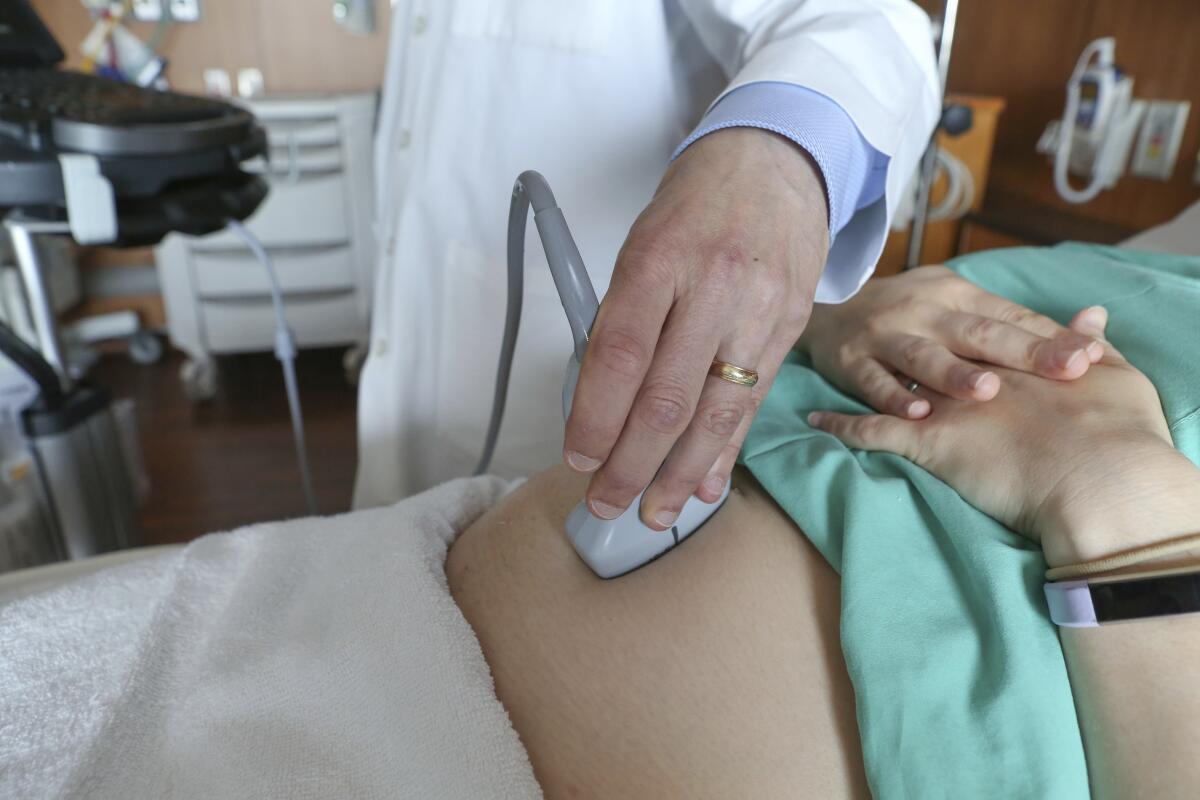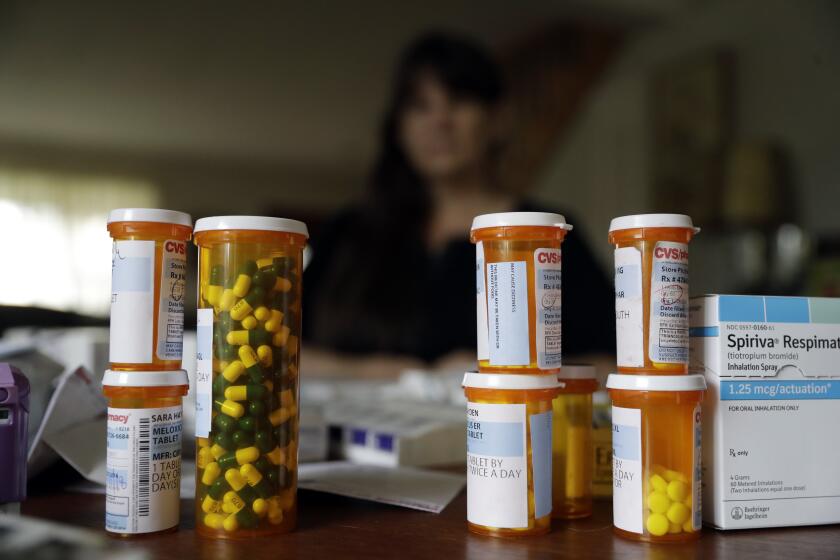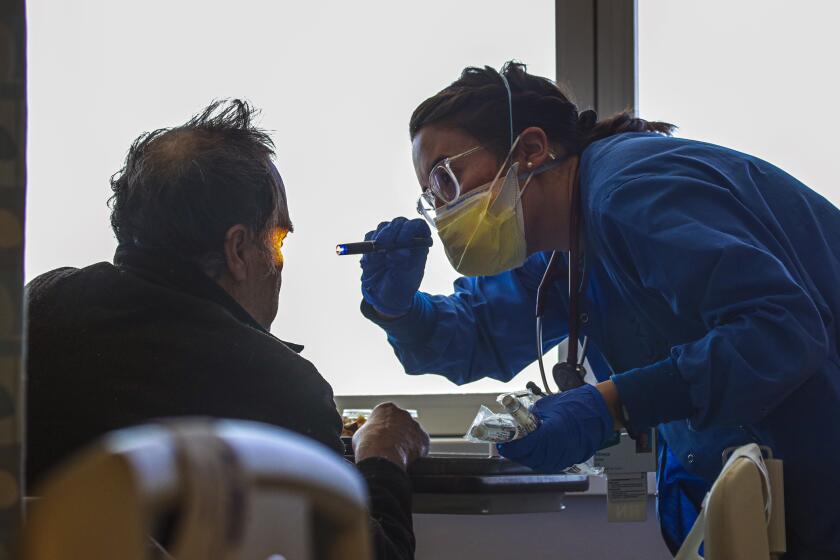California changed its prenatal testing program. It’s been ‘extremely frustrating,’ patients say

- Share via
On Nov. 1, Kate Manriquez, whose first child is due in May, did what many women do a couple months into their pregnancies: She gave a blood sample at her doctor’s office for a genetic test meant to help detect birth defects. More than a month later, 26-year-old Manriquez is still anxiously awaiting her results from California’s state-run prenatal screening program.
“It has been extremely frustrating and caused a lot of stress,” said Manriquez, who lives in Anaheim.
Manriquez’s experience isn’t unique. In online pregnancy discussion groups, dozens of California women have detailed their long waits for results and the anxiety it has caused as they wonder whether their children could have one of the rare disorders.
The reported delays came after California health officials changed regulations governing the state’s prenatal testing program. On Sept. 19, without holding the public hearing that is usually required to change regulations, the state limited the program so that just four companies could process the tests that look for genetic disorders such as Down syndrome. Natera, Quest Diagnostics, PerkinElmer and Kaiser were awarded contracts to perform the three noninvasive prenatal tests, or NIPTs, covered by the state program.
The move prompted Labcorp and Myriad Genetics, two corporate labs that had been selling the tests but were banned from offering the three in the state program under the new rules, to bring a suit against the state’s public health department on Sept. 16.
Four managed-care insurance plans may lose contracts with California’s Medicaid program, which would force nearly 2 million low-income residents to switch their health plans — and possibly their doctors. The plans are fighting back.
On Oct. 29, a Superior Court judge in San Francisco issued an order to temporarily halt the state public health department’s new rules, saying that a trial probably would find that officials made the changes illegally. He said that the state had enacted the rules as an “emergency” public health regulation when there was no emergency.
California has offered the taxpayer-subsidized prenatal screenings, which are free for the patient, since 1986. The three tests look for the chromosomal abnormalities that cause Down syndrome, Edwards syndrome and Patau syndrome.
Until officials changed the regulations, women and their doctors could decide whether to use the state’s program or instead opt to choose any lab offering the screenings and have it billed to their insurance. Results often took little more than a week.
For each woman opting for the three tests in the program, the rules require insurers to pay a $232 fee to the state. The fees cover the cost of the screenings as well as genetic counseling and the additional testing needed for any patient who screens positive.
In comparison, list prices for the same tests in 2018 ranged from $1,100 to $1,590, according to a study published last year.
Each year from 2020 to 2022, rates in California rose by less than 2%, Covered California said.
State officials told doctors that the results would be recorded in a government database, and in turn delivered more quickly to patients.
In their lawsuit, Labcorp and Myriad argued that the program violated women’s right to privacy since they would have to use the state program and the contracted labs if they wanted the three common prenatal screening tests. Californians would not be able to choose the prenatal screening of their choice, the complaint said, “without the prying eyes of the state.”
State public health officials declined to speak to The Times. In a written statement, officials said they made the changes to ensure “high quality, affordable, up-to-date prenatal screening available to every pregnant Californian.”
As part of the changes, they said, the state switched from an older method of prenatal screening to a newer technology called cell-free DNA screening, which is more accurate.
Officials disputed reports that large numbers of results had been delayed. According to the department’s data, they said, from Oct. 15 to Nov. 15, 98% of results were reported to the patient’s physician within 14 days.
State officials also questioned claims by doctors and labs that the department had not consulted them before changing the rules. They said they had been meeting with physicians and others involved in the testing since 2019.
The state has appealed the judge’s preliminary injunction, officials said.
For lab companies, the prenatal tests have become a profitable and fast-growing business. The companies offer prenatal screenings for the three rare disorders as well as dozens of other possible but uncommon birth defects.
Lost in the promotion of those tests and the push by companies and the state to offer them is data showing the results can be wrong.
The prenatal tests are not regulated by the Food and Drug Administration and the agency has not tried to confirm how accurate they are.
In April, the FDA warned that the tests could give false results, including “reporting a genetic abnormality when the fetus does not actually have one.”
The agency said it was aware of reports that patients had decided to terminate pregnancies based on the screenings even though they are meant only to show whether there is a higher risk that the fetus could have a certain birth defect. If a screening comes back positive, the agency said, other tests are required to show the fetus actually has the abnormality.
Some doctors recommend the screenings only for women considered to be at higher risk of birth defects, including those age 35 or older.
On Oct. 26, more than a month after the state mandated the new rules, officials held a meeting at which doctors, genetic counselors, patients and lab executives complained about the changes.
“Our patients have been very upset,” Lawrence Platt, a UCLA clinical professor of obstetrics and gynecology, said at the hearing.
He pointed to language in the regulation that said physicians’ licenses could be jeopardized if they did not follow the new rules.
“This program is a mistake and it needs to be changed urgently,” Platt said. “It needs to get back on track to really helping the pregnant population and their families.”
More to Read
Inside the business of entertainment
The Wide Shot brings you news, analysis and insights on everything from streaming wars to production — and what it all means for the future.
You may occasionally receive promotional content from the Los Angeles Times.













